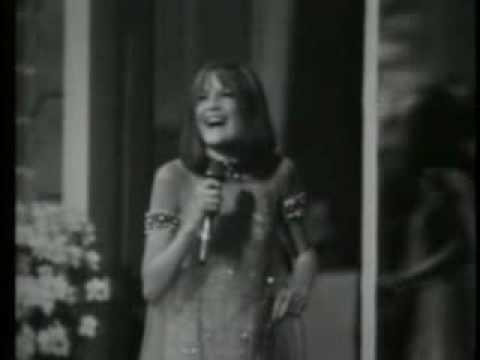For six decades, the United Kingdom has been a steadfast participant in the Eurovision Song Contest, a competition known for its dazzling performances and occasional controversies. While recent years haven’t been particularly kind to the UK in terms of securing top spots, the nation boasts a rich history with the iconic competition, marked by both glorious victories and disappointing defeats. Let’s delve into the UK’s Eurovision journey, revisiting the triumphant moments and analyzing the factors that led to less favorable outcomes.
Shining a Light on UK’s Eurovision Wins
The UK holds the distinction of being one of the most successful countries in Eurovision history, having clinched the coveted title five times. These victories highlight the nation’s diverse musical talent and its ability to captivate audiences across Europe.
1. Sandie Shaw’s Groundbreaking Win with “Puppet on a String” (1967)
 Eurovision Song Contest 1967 – Sandie Shaw – Puppet on a String (WINNER)
Eurovision Song Contest 1967 – Sandie Shaw – Puppet on a String (WINNER)
Sandie Shaw’s “Puppet on a String” marked the UK’s first-ever Eurovision victory after a string of second-place finishes in the preceding years. The song, however, wasn’t a particular favorite of Shaw’s, who later expressed her dislike for its lyrics and musical style. Despite her personal reservations, “Puppet on a String” resonated with audiences across Europe, becoming a testament to the unpredictable nature of Eurovision success.
2. Lulu’s Triumphant “Boom Bang a Bang” (1969)
 Lulu – Boom Bang A Bang (Eurovision – 1969)
Lulu – Boom Bang A Bang (Eurovision – 1969)
Two years after Shaw’s victory, Lulu took the Eurovision stage by storm with her powerful rendition of “Boom Bang a Bang.” In a surprising turn of events, the song tied for first place with three other entries, highlighting the fierce competition and diversity of musical styles present that year. This shared victory further solidified the UK’s position as a force to be reckoned with in the competition.
3. Brotherhood of Man Steals Hearts with “Save Your Kisses for Me” (1976)

The mid-1970s saw the rise of ABBA, a Swedish pop group that would go on to achieve global stardom. Amidst this changing musical landscape, the UK secured another victory with Brotherhood of Man’s incredibly catchy “Save Your Kisses for Me.” The song’s popularity transcended the competition, topping the UK charts weeks before Eurovision and becoming one of the best-selling singles of all time.
4. Bucks Fizz’s Unforgettable Performance of “Making Your Mind Up” (1981)
 Bucks Fizz – Making your mind up – song for europe 1981
Bucks Fizz – Making your mind up – song for europe 1981
Bucks Fizz’s “Making Your Mind Up” is often credited with introducing a new element to Eurovision performances: the gimmick. The group’s iconic skirt-ripping routine added a visual spectacle to their performance, solidifying their place in Eurovision history. Despite facing criticism for their vocal performance, Bucks Fizz emerged victorious, proving that showmanship could be just as impactful as vocal prowess.
5. Katrina and the Waves Ride the Wave of Success with “Love Shine a Light” (1997)
 Love Shine a Light – Katrina and The Waves
Love Shine a Light – Katrina and The Waves
After a series of near misses in the 1980s and early 1990s, Katrina and the Waves brought the Eurovision trophy back to the UK with their uplifting anthem, “Love Shine a Light.” The song’s universal appeal and positive message resonated deeply with audiences, securing a landslide victory for the UK.
Navigating the Challenges: UK’s Eurovision Struggles
Despite its early successes, the UK has faced its share of challenges in the Eurovision Song Contest, particularly in recent years. Several factors have contributed to the nation’s less favorable results, leading to much discussion and debate among fans and critics alike.
The “Nil Points” Curse and Its Aftermath
The year 2003 marked a turning point for the UK in Eurovision history. Jemini, a pop duo representing the nation, received “nul points” (zero points) for their performance of “Cry Baby,” a first for the UK. Technical difficulties plagued their performance, resulting in an off-key rendition that failed to impress the juries. This disappointing outcome sparked widespread analysis of the UK’s approach to the competition and the factors influencing its performance.
The Search for Answers: Deconstructing the UK’s Eurovision Performance
Following Jemini’s “nul points” experience, the UK found itself consistently placing in the lower ranks of the competition. Several theories have emerged attempting to explain this decline:
Political Voting: Some argue that the voting bloc system, where countries tend to favor their neighbors or political allies, has disadvantaged the UK.
Lack of Innovation: Others point to a perceived lack of innovation in the UK’s song choices and staging, arguing that the nation has failed to keep pace with the evolving trends of the competition.
Shifting Musical Landscape: The global music scene has undergone significant changes since the UK’s last victory in 1997. The rise of new genres and the evolving tastes of audiences have presented challenges for the UK in selecting songs with broad appeal.
A Glimmer of Hope: Sam Ryder’s 2022 Success
Sam Ryder’s performance of “Space Man” in 2022 offered a much-needed beacon of hope for the UK. Ryder’s powerful vocals, charismatic stage presence, and the song’s catchy melody propelled him to second place, the nation’s best result in over two decades. This success demonstrated that the UK still possesses the talent and potential to excel in the competition.
Looking Ahead: The Future of the UK in Eurovision
The UK’s journey in the Eurovision Song Contest has been a rollercoaster ride of triumphs and setbacks. While recent years have been challenging, the nation’s historical success and the positive reception of Sam Ryder’s 2022 performance suggest that a brighter future is possible. By embracing innovation, selecting songs that resonate with a broad audience, and showcasing the best of British musical talent, the UK can once again become a formidable contender for the Eurovision crown.



